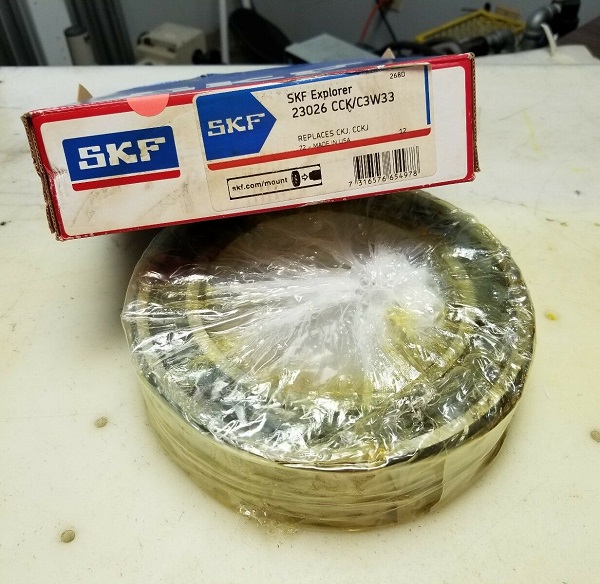1. Tribological compatibility
The performance of preventing adhesion and forming boundary lubrication when the shaft diameter is in direct contact with the bearing shell. The material factors that affect the friction compatibility of the friction pair are:
(1) The degree of difficulty in metallurgical formation of alloys.
(2) The affinity of materials and lubricants.
(3) The friction factor of the paired material in the non-lubricated state.
(4) The microstructure of the material.
(5) The thermal conductivity of the material.
(6) The size of the surface energy of the material and the characteristics of the oxide film.
2. Embeddedness
The ability of the material to allow foreign hard particles in the lubricant to clamp in and prevent scratches or (and) abrasive wear. For metallic materials, the ones with low hardness and low modulus of elasticity have good embedding properties, while non-metallic materials such as carbon graphite have low modulus of elasticity but poor embedding properties. Sliding SKF bearings usually use softer and harder materials to form the friction width, and generally use softer materials as bearing bushes. SKF 23026 CCK/C3W33 bearings online , pls click here :

3. Running-in
In the process of running-in between the shaft diameter and the bearing bush, the ability to reduce the machining error of the shaft diameter and the bearing bush, the concentricity error, and the surface roughness parameter value, so as to make the contact uniform, thereby reducing the friction and wear rate.
4. Friction compliance
The material relies on the elastoplastic deformation of the surface to compensate for the initial poor fit and bending performance of the sliding friction surface. Materials with low elastic modulus have better compliance.
5. Abrasion resistance
The ability of a pair of materials to resist wear. Under specified wear conditions, wear resistance is expressed by the reciprocal of wear rate or wear degree and wear amount.
6. Fatigue resistance
The ability of the material to resist fatigue damage under cyclic loading. At the service temperature, the strength, hardness, impact strength and uniformity of the bearing material are very important for fatigue resistance. Materials with good running-in and embedding properties usually have poor fatigue resistance.
7. Corrosion resistance
The ability of the material to resist corrosion. Lubricating oil will gradually oxidize when used in the atmosphere to produce acidic substances, and most lubricating oils also contain extreme pressure additives, which will corrode SKF bearing materials. Therefore, SKF bearing materials need to have corrosion resistance.
8. Cavitation resistance
When the solid is moving relative to the liquid, when the bubbles in the liquid rupture near the solid surface, local impact high pressure or local high temperature will be generated, which will cause cavitation wear. The ability of a material to resist cavitation wear is called cavitation resistance. Generally, copper-lead alloys, tin-based SKF bearing alloys and aluminum-zinc-silicon alloys have better cavitation resistance.
9. Compressive strength
The ability to withstand unidirectional load without being crushed or the size unchanged.
The importance of SKF roller bearing sealing
The sealing of the bearing is to keep the roller bearing in good lubrication conditions and normal working environment, give full play to the working performance of the bearing, and prolong the service life. The rolling bearing must have a suitable seal to prevent the leakage of lubricant, dust and moisture. Or the intrusion of other dirt. SKF bearing seals can be divided into two types: self-contained seal and external seal. The so-called bearing with its own seal is to make the bearing itself into a device with sealing performance. Such as bearing belts, etc. This kind of seal occupies a small space, is convenient to install and disassemble, and the cost is relatively low.
The so-called bearing external sealing performance device is a sealing device with various performances manufactured inside the installation end cover.
The following main factors should be considered in the selection of SKF roller bearings with external seals:
(1) Bearing lubricants and types;
(2) The working environment of the bearing and the size of the space occupied;
(3) The advantages of the shaft supporting structure and the allowable angular deviation;
(4) The circumferential speed of the sealing surface;
(5) The working temperature of the bearing;
(6) The manufacturing cost.
Thickeners are also related to lubricating oil. Grease water thickeners determine the resistance of water. In principle, greases are not mixed with different brands. Even thickener greases will also affect each other due to different additives. To coat the bearing with anti-rust oil, it must be cleaned carefully with gasoline or kerosene, and then coated with clean high-quality or high-speed high-temperature grease before installation. Enclosed bearings do not require clean fuel.
In the course of use, SKF roller bearings are often basically monitored externally, such as temperature, vibration and noise measurement conditions, and so on. These regular inspections can detect potential problems early and prevent accidental suspension of the machine, so that the production plan can be realized and the productivity and efficiency of the factory can be improved.
In the process of operation, the correct bearing needs to be relubricated to improve its performance. The lubrication method of SKF bearings is divided into grease lubrication and oil lubrication. In order to give full play to the function of roller bearings, first of all, it is necessary to select suitable conditions for the purpose of the lubrication method. If only lubrication is considered, oil-lubricated lubrication is dominant. However, the expertise grease for the structure around the bearing can be simplified.
Hot Tags: